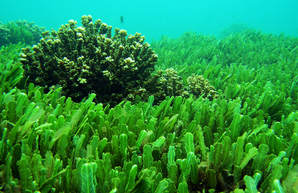|
by Olivia Woodford-Berry, '19  Since the Industrial Revolution, the average pH of the ocean has dropped from 8.4 to 8.2, and scientists anticipate it to fall below 7.9 within the next one hundred years. [1] At the same time, concerns are intensified by rising temperatures in crucial ecosystems. In a plea for public attention and government funding, environmental groups often plug the same eye catching photo of a polar bear, confused, perched on top of a melting iceberg. While this furry animal might tug at one’s heart strings, the more ecologically important victim of ocean warming and acidification is far less appealing to our love of animals.  Marine algae is responsible for producing seventy to eighty percent of breathable oxygen. [2] Thus, the research exploring the effects of ocean acidification on these organisms is crucial in understanding the future of marine and terrestrial ecosystems. Certain studies examining algae species under warmer, acidic conditions suggest the effects of ocean acidification on primary oxygen production are minimal. [3] However, other studies have demonstrated that ocean acidification may have other, unexpected consequences on algal health. In 2013, one study examined the effects of decreased pH on marine plants’ ability to produce phenolic substances, such as herbivore deterrents, tannins, and ultraviolet sunscreens. The results showed that marine plants produce less phenolic substances when exposed to greater than typical levels of CO2, the exact opposite reaction of terrestrial plants. [4] Thus, this data suggests that ocean acidification may result in an overall decrease of algal population that would, overtime, lead to lower oceanic oxygen output. Furthermore, subsequent studies have used oceanic models to look into what this means for larger organisms. This work has demonstrated that ocean acidification in combination with rising temperatures may consequently have indirect, negative effects on fish populations by disrupting the food web. [5] Recent research demonstrates that the biggest consequences of rising aquatic temperatures may be rooted in the tiniest organisms. Ocean acidification and rising temperature may undermine oxygen levels and marine food chains by disrupting these base creatures. Thus, as anthropogenic carbon dioxide emissions continue to increase, our growing understanding of the environmental consequences paint a bleak picture of what this ultimately means for the oceans and for humans. Sources:
0 Comments
Leave a Reply. |
